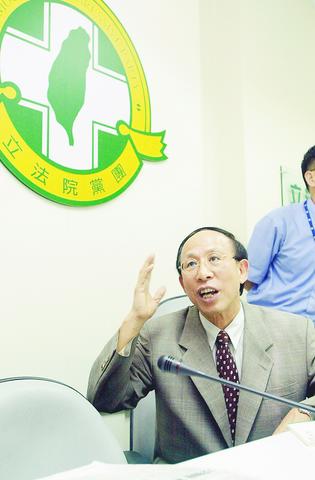The DPP yesterday sought to downplay President Chen Shui-bian's (陳水扁) call on Saturday for a referendum on the nation's future, saying that Chen's comments had been "over-interpreted" by the media.
"The referendum would be to defend the current status of Taiwan, not to change its current status. Unfortunately, [Chen's comments] were widely misinterpreted as calling for a change to the current status," DPP Secretary-General Chang Chun-hsiung (張俊雄) said at a press conference yesterday evening.
Chen told a Tokyo meeting of the World Federation of Taiwanese Associations via satellite video broadcast that there is "one country on either side" (of the Taiwan Strait) and that the nation should seriously consider passing referendum legislation so that a vote on Taiwan's future could be held.

PHOTO: GEORGE TSORNG, TAIPEI TIMES
DPP legislative whip Wang Tuoh (
"Many international media organizations interpreted President Chen's remarks as heading toward a path of independence, but I think they were over-interpreted," he said.
Chen's comments were widely considered his toughest to date on cross-strait affairs.
As to the issue of referendum legislation, Wang cautioned that the matter is highly contentious.
"Referendum legislation is a controversial issue between political parties and its implementation might lead to the unsteadiness of Taiwan's politics. I would remind my colleagues of the risks we would be undertaking if they propose the idea to the Legislative Yuan," Wang said.
Executive Director of the DPP's Policy Research and Coordinating Committee Lin Cho-shui (
"Beijing has said that it would separate economic issues from political ones and that it would attempt to discuss insensitive issues before sensitive ones. But it hasn't done anything to implement such ideas over the past two years," Lin said.
"After Beijing's series of provocative actions, it's about time for us to be tough on Beijing. We have to make Beijing understand reality clearly and not to have any unpractical expectations of Taiwan," he said.
Some academics, however, worried Chen might have gone too far this time.
"President Chen created a lot of space for cross-strait relations with his `five no's' policy. The new remarks, however, show his bottom line. What else can Chen say to scare Beijing next time?" said Wu Yu-shan (

AIR SUPPORT: The Ministry of National Defense thanked the US for the delivery, adding that it was an indicator of the White House’s commitment to the Taiwan Relations Act Deputy Minister of National Defense Po Horng-huei (柏鴻輝) and Representative to the US Alexander Yui on Friday attended a delivery ceremony for the first of Taiwan’s long-awaited 66 F-16C/D Block 70 jets at a Lockheed Martin Corp factory in Greenville, South Carolina. “We are so proud to be the global home of the F-16 and to support Taiwan’s air defense capabilities,” US Representative William Timmons wrote on X, alongside a photograph of Taiwanese and US officials at the event. The F-16C/D Block 70 jets Taiwan ordered have the same capabilities as aircraft that had been upgraded to F-16Vs. The batch of Lockheed Martin

GRIDLOCK: The National Fire Agency’s Special Search and Rescue team is on standby to travel to the countries to help out with the rescue effort A powerful earthquake rocked Myanmar and neighboring Thailand yesterday, killing at least three people in Bangkok and burying dozens when a high-rise building under construction collapsed. Footage shared on social media from Myanmar’s second-largest city showed widespread destruction, raising fears that many were trapped under the rubble or killed. The magnitude 7.7 earthquake, with an epicenter near Mandalay in Myanmar, struck at midday and was followed by a strong magnitude 6.4 aftershock. The extent of death, injury and destruction — especially in Myanmar, which is embroiled in a civil war and where information is tightly controlled at the best of times —

China's military today said it began joint army, navy and rocket force exercises around Taiwan to "serve as a stern warning and powerful deterrent against Taiwanese independence," calling President William Lai (賴清德) a "parasite." The exercises come after Lai called Beijing a "foreign hostile force" last month. More than 10 Chinese military ships approached close to Taiwan's 24 nautical mile (44.4km) contiguous zone this morning and Taiwan sent its own warships to respond, two senior Taiwanese officials said. Taiwan has not yet detected any live fire by the Chinese military so far, one of the officials said. The drills took place after US Secretary

THUGGISH BEHAVIOR: Encouraging people to report independence supporters is another intimidation tactic that threatens cross-strait peace, the state department said China setting up an online system for reporting “Taiwanese independence” advocates is an “irresponsible and reprehensible” act, a US government spokesperson said on Friday. “China’s call for private individuals to report on alleged ‘persecution or suppression’ by supposed ‘Taiwan independence henchmen and accomplices’ is irresponsible and reprehensible,” an unnamed US Department of State spokesperson told the Central News Agency in an e-mail. The move is part of Beijing’s “intimidation campaign” against Taiwan and its supporters, and is “threatening free speech around the world, destabilizing the Indo-Pacific region, and deliberately eroding the cross-strait status quo,” the spokesperson said. The Chinese Communist Party’s “threats